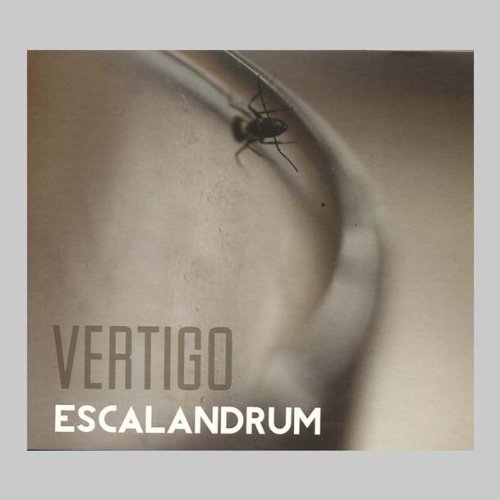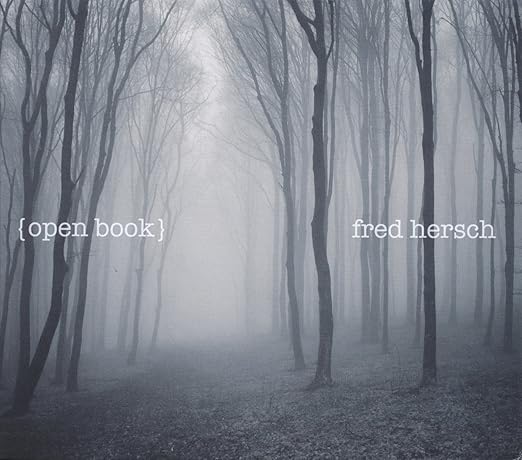Vertigo

By Fernando Rios
Integrado por ocho composiciones nuevas y propias, tres del saxofonista Damián Fogiel y el resto del pianista Nicolás Guerschberg, este séptimo disco de Escalandrum, y primero en vivo en toda su carrera, renueva su enorme presencia en el escenario local, luego del excelente “Piazzolla plays Piazzolla”, con el que en 2012 ganaron el Gardel de Oro (máxima distinción de la industria musical argentina) y el Gardel al Mejor Album de Jazz.
Para Nicolás Guerschberg “Vertigo” es todo un desafío. “Después de revisitar la obra de Astor Piazzolla, retomar nuestra senda con composiciones propias no era fácil, pero salimos muy enriquecidos de la experiencia, con un lenguaje urbano y contemporáneo aplicado en la improvisación y una amalgama del grupo con todos estos años de experiencias juntos.
Para Mariano Sívori este “Vertigo” tiene que ver con el viejo anhelo del grupo de grabar en vivo en un club de jazz, pero también, dice, “es una apuesta a seguir proponiendo nuevas variaciones sobre nuestro sonido, luego del homenaje y riesgo de ‘Piazzolla plays Piazzolla”.Aquí además Guerschberg asume el doble desafio de la autoría en cinco de los temas “Como compositor siempre trato de dar mi mayor esfuerzo por lograr la mejor calidad posible en las obras y ‘Vértigo’, asegura, es el reflejo de todo esto con el plus de ser nuestro primer cd totalmente en vivo”.
Martín Pantyner también adhiere al concepto. Este disco cierra un año idílico para el grupo, en el que hicimos más de 60 conciertos por Argentina y por el mundo y ganamos el Gardel por el mejor disco de jazz y el Gardel de Oro. Como dirían en el barrio, el sueño del pibe”.
También desde doble sitial de saxofonista y autor, Damián Fogiel pronostica que el nuevo disco de Escalandrum será un punto de inflexión en la rica historia del grupo.
Este disco “sintetiza la búsqueda del sonido propio, sobre el cual venimos trabajando hace muchos años y refleja el crecimiento individual y colectivo que logramos tras nuestra intensa revisión de la música de Astor Piazzolla”, reseña Fogiel.
Escalandrum lleva 14 años como grupo con su formación original y han editado siete discos. Han actuado en más de 40 países y cosechado numerosos premios. En 2002 fueron distinguidos por la Fundación Konex como una de las cien figuras más importantes de la cultura argentina. En 2011 el grupo argentino fue nominado a los Grammy Latinos compartiendo terna nada menos que con Chick Corea y Al Di Meola.
Escalandrum:
Daniel “Pipi” Piazzolla, batería; Nicolás Guerschberg, piano; Mariano Sívori, en contrabajo.
Gustavo Musso, en saxo alto; Damián Fogiel, saxo tenor;
Martín Pantyrer, clarinete bajo y saxo barítono.
Amaro Freitas
Sangue Negro

By Tratore
Sangue Negro, disco de estreia do pianista Amaro Freitas, produzido pelo gaúcho Rafael Vernet, acompanhado pelo baixista Jean Elton e pelo baterista Hugo Medeiros, com participações do saxofonista Eliudo Souza e do trompetista Fabinho Costa. O disco reinaugura uma linhagem de jazz autoral. Minimalismo, Bebop, Afrojazz, Samba, Frevo e Balada, estas são algumas das sonoridades que permeiam Sangue Negro.
Jerónimo Carmona
Lament

By Jakob Baekgaard
Jazz listeners familiar with the characteristic sound and aesthetic of Argentinian label Rivorecords will know the deep, swinging sound of bassist Jerónimo Carmona, who has been a strong presence on many releases on the label, including albums by pianists Ernesto Jodos and Paula Shocron. With Lament, Carmona gets the chance to step into the spotlight himself.
Lament is conceived as a duo album, but it isn't a duo album in the traditional sense. Instead, the album consists of a series of duets between the bassist and the musical voices of saxophonist Sebastián Loiacono, flugelhorn-player Mariano Loiacono, pianist Guillermo Romero and guitarist Marcelo Gutfraind.
Romero plays with the mournful sensitivity of pianist Bill Evans on "Lament" and the crisp chords of guitarist Gutfraind add an extra touch of sophistication on "Indian Summer" while Mariano Loiacono's warm flugelhorn swings fluorescently on a relaxed interpretation of Dizzy Gillespie's "Groovin' High" where the bassist's walking bass patterns and precise punctuations on the theme is a joy to behold.
Throughout the album, Carmona underlines why he is in demand as a sideman. It is primarily his sense of space that makes him such a good bassist. He makes the grooves grow organically out of the air.
The album ends with a strong solo interpretation of "I Fall in Love Too Easily" and indeed it is also easy to fall in love with the music on Lament.
Track Listing:
If I Should Lose You; Milestones; Groovin' High; You're My Everything; Lament; The Way You Look Tonight; Blue and Sentimental; Indian Summer; In Your Own Sweet way; I Fall in Love Too Easily.
Personnel:
Jerónimo Carmona: bass; Sebastian Loiacono: tenor saxophone; Mariano Loiacono; flugelhorn; Guillermo Romero: piano; Marcelo Gutfraind: electric guitar.
Fred Hersch
Open Book

By Dan McClenaghan
In the aftermath of his coma and very possible demise back in 2008, pianist Fred Herschblossomed from a status as a first rate jazz pianist into the rarified air of one of the handful of top practitioners of that art form. A series of post-illness albums, from Whirl(2010), to Alone At The Vanguard (2011) to Floating (2014), Solo (2015) and Sunday Night At the Vanguard (2016), all on Palmetto Records, are all solo and trio outings that reveal a heightened artistic clarity and unabashed vulnerability, alongside a deeper emotive approach, this in comparison to his uniformly excellent, but perhaps more cerebral output before his struggle with serious health problems.
Now we have Open Book, Hersch's eleventh solo piano outing.
Intimacy is a hallmark of Hersch's music, and "The Orb," the set's opener, taken from Hersch's autobiographical music/theater piece, My Coma Dreams, is the tenderest, loveliest of love songs, a look at a paramour through, with justification it seems, rose-colored glasses. "Whisper Not," Benny Golson's classic tune, takes things into a turn of the playful, via crisp, prancing piano notes singing over a serious and assertive left hand. Hersch visits an old friend, Antonio Carlo Jobim, with "Zingaro," a sublime reverie.
The centerpiece, "Through The Forest," is something unheard of on record by Hersch. It's a nineteen minutes-plus, stream-of-consciousness, improvised in-the-moment masterpiece. An ebb and flow dreamscape of sorts—the most fragile of delicacies and the most sacred and quiet moments slipped in beside emphatic percussive energy—music as enchanting as anything the pianist has ever created.
Then in walks Monk. Hersch includes a Thelonious Monk tune in most every set, most every recording. "Eronel" is a spritely interpretation by Hersch, who immerses himself the challenging music deeper than most anybody, peppering the stride-side with sparkling, water-splashing-off-the-rocks sounds, rolling into jagged eddies, leading into the closer, Billy Joel's "And So It Goes," solemn, simple, honest, beautiful.
Honesty—another hallmark of Hersch's art.
This is a recording that makes it seem as though Fred Hersch is the finest jazz pianist in the world. That's an impossible assertion, of course. There are a dozen, maybe more pianists who have achieved this level artistry. But for now, with Open Book, he can wear that title.
Track Listing:
The Orb; Whisper Not; Zingaro; Through the Forest; Plainsong; Eronel; And So It Goes.
Personnel:
Fred Hersch: piano
Amaro Freitas
Sangue Negro
By Tratore
Sangue Negro, disco de estreia do pianista Amaro Freitas, produzido pelo gaúcho Rafael Vernet, acompanhado pelo baixista Jean Elton e pelo baterista Hugo Medeiros, com participações do saxofonista Eliudo Souza e do trompetista Fabinho Costa. O disco reinaugura uma linhagem de jazz autoral. Minimalismo, Bebop, Afrojazz, Samba, Frevo e Balada, estas são algumas das sonoridades que permeiam Sangue Negro.
Jerónimo Carmona
Lament

By Jakob Baekgaard
Jazz listeners familiar with the characteristic sound and aesthetic of Argentinian label Rivorecords will know the deep, swinging sound of bassist Jerónimo Carmona, who has been a strong presence on many releases on the label, including albums by pianists Ernesto Jodos and Paula Shocron. With Lament, Carmona gets the chance to step into the spotlight himself.
Lament is conceived as a duo album, but it isn't a duo album in the traditional sense. Instead, the album consists of a series of duets between the bassist and the musical voices of saxophonist Sebastián Loiacono, flugelhorn-player Mariano Loiacono, pianist Guillermo Romero and guitarist Marcelo Gutfraind.
Romero plays with the mournful sensitivity of pianist Bill Evans on "Lament" and the crisp chords of guitarist Gutfraind add an extra touch of sophistication on "Indian Summer" while Mariano Loiacono's warm flugelhorn swings fluorescently on a relaxed interpretation of Dizzy Gillespie's "Groovin' High" where the bassist's walking bass patterns and precise punctuations on the theme is a joy to behold.
Throughout the album, Carmona underlines why he is in demand as a sideman. It is primarily his sense of space that makes him such a good bassist. He makes the grooves grow organically out of the air.
The album ends with a strong solo interpretation of "I Fall in Love Too Easily" and indeed it is also easy to fall in love with the music on Lament.
Track Listing:
If I Should Lose You; Milestones; Groovin' High; You're My Everything; Lament; The Way You Look Tonight; Blue and Sentimental; Indian Summer; In Your Own Sweet way; I Fall in Love Too Easily.
Personnel:
Jerónimo Carmona: bass; Sebastian Loiacono: tenor saxophone; Mariano Loiacono; flugelhorn; Guillermo Romero: piano; Marcelo Gutfraind: electric guitar.
Fred Hersch
Open Book

By Dan McClenaghan
In the aftermath of his coma and very possible demise back in 2008, pianist Fred Herschblossomed from a status as a first rate jazz pianist into the rarified air of one of the handful of top practitioners of that art form. A series of post-illness albums, from Whirl(2010), to Alone At The Vanguard (2011) to Floating (2014), Solo (2015) and Sunday Night At the Vanguard (2016), all on Palmetto Records, are all solo and trio outings that reveal a heightened artistic clarity and unabashed vulnerability, alongside a deeper emotive approach, this in comparison to his uniformly excellent, but perhaps more cerebral output before his struggle with serious health problems.
Now we have Open Book, Hersch's eleventh solo piano outing.
Intimacy is a hallmark of Hersch's music, and "The Orb," the set's opener, taken from Hersch's autobiographical music/theater piece, My Coma Dreams, is the tenderest, loveliest of love songs, a look at a paramour through, with justification it seems, rose-colored glasses. "Whisper Not," Benny Golson's classic tune, takes things into a turn of the playful, via crisp, prancing piano notes singing over a serious and assertive left hand. Hersch visits an old friend, Antonio Carlo Jobim, with "Zingaro," a sublime reverie.
The centerpiece, "Through The Forest," is something unheard of on record by Hersch. It's a nineteen minutes-plus, stream-of-consciousness, improvised in-the-moment masterpiece. An ebb and flow dreamscape of sorts—the most fragile of delicacies and the most sacred and quiet moments slipped in beside emphatic percussive energy—music as enchanting as anything the pianist has ever created.
Then in walks Monk. Hersch includes a Thelonious Monk tune in most every set, most every recording. "Eronel" is a spritely interpretation by Hersch, who immerses himself the challenging music deeper than most anybody, peppering the stride-side with sparkling, water-splashing-off-the-rocks sounds, rolling into jagged eddies, leading into the closer, Billy Joel's "And So It Goes," solemn, simple, honest, beautiful.
Honesty—another hallmark of Hersch's art.
This is a recording that makes it seem as though Fred Hersch is the finest jazz pianist in the world. That's an impossible assertion, of course. There are a dozen, maybe more pianists who have achieved this level artistry. But for now, with Open Book, he can wear that title.
Track Listing:
The Orb; Whisper Not; Zingaro; Through the Forest; Plainsong; Eronel; And So It Goes.
Personnel:
Fred Hersch: piano










